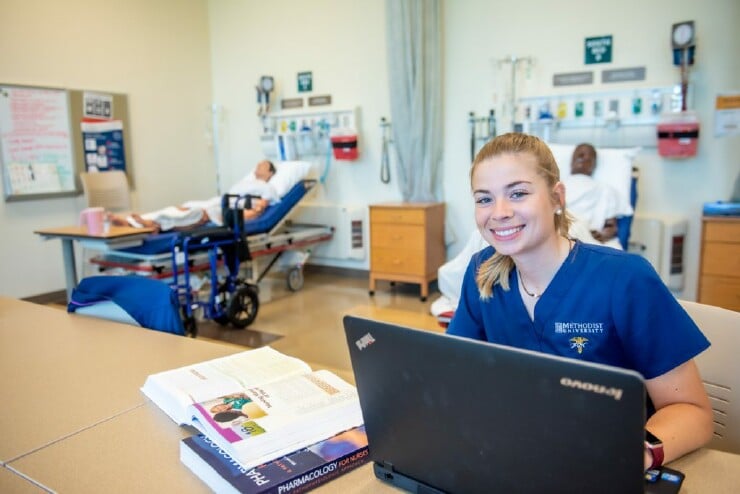The U.S. Department of Health Resources and Services Administration (HRSA) has awarded a grant of more than $499,000 to the Nursing Department at Methodist University. The funds target specific training for pre-licensure public health nursing students and faculty to recognize and respond to opioid use and strengthen the professional development of public health nurses across North Carolina.
The investment in MU by HRSA to equip tomorrow’s nursing healthcare professionals is a solid investment and a step in the right direction to combat North Carolina’s opioid crisis. MU’s program was the only North Carolina program, public or private, to receive the grant. Ten other nursing programs in the country also received the grant, including Ohio State University, Texas A&M, University of Tennessee, Emory University, University of Cincinnati, and others.
“During the early days of the pandemic shut-down last spring, everyone became acutely aware of the need for highly qualified public health nurses,” said Shannon Matthews, director of Nursing at MU. “In addition to community strain on the public health system due to COVID-19, opioid overdose and substance misuse have reached all-time highs in Cumberland County and surrounding communities.”
The Methodist University Nursing Program graduated its first Bachelor of Science in Nursing class in 2014. Since then, the program has awarded nursing degrees to more than 170 graduates, many of whom have remained in North Carolina and the greater Fayetteville and Cumberland County areas. The program provides future nurses with a hands-on education using state-of-the-art simulation technology — including the MU General Simulation Hospital — as well as simulated patients of all ages. Cameras are equipped throughout the hospital to observe and guide students through their studies.
“Nursing is one of the jewels in the crown at Methodist University – a university that is becoming rapidly known for its excellent health care programs,” said MU President Dr. Stanley Wearden. “This investment from the U.S. Department of Health Resources and Services Administration will not only help educate our students but prepare them for the hard work ahead in combatting North Carolina’s opioid crisis as health care professionals.”
Methodist University’s Simulation Education Training-Recovery Now (SET-RN) is led by highly qualified and experienced public health nurse educators and prepares public health nursing students to directly impact objectives in the North Carolina Department of Health and Human Services. For the next two years, the goal of MU’s nursing program is to prepare 75 unique pre-licensure nursing students with enhanced public nursing competencies to recognize and respond to substance and opioid misuse by creating enhanced interprofessional education simulation exercises in their state-of-the-art facilities.
“Simulation scenarios and clinical experiences reflective of substance misuse will be threaded throughout the nursing curriculum to help our graduates recognize and respond to adult, adolescent, and pediatric clients with substance misuse and overdose in a variety of settings,” stated Matthews.
Also, powered by this new grant, MU will strengthen statewide support and professional development by delivering workshops for nursing faculty and collaborating with state professional nursing organizations.
Nursing faculty member and Simulation Director, Mitzi Averette, MSN, RN, CNE, CHSE, is a long-time advocate for recovery and will be the project coordinator. Averette has strong connections in the community and is a champion of increasing public awareness and resources to address substance misuse and developing programs to reduce stigma associated with substance use disorder. Averette has already begun work establishing collegiate recovery groups on local campuses and promoting training for faculty and students in recovery strategies.
“We are excited to begin this project and the positive impact it will have on public health nursing and the care of those struggling with substance use disorders,” Matthews said.
